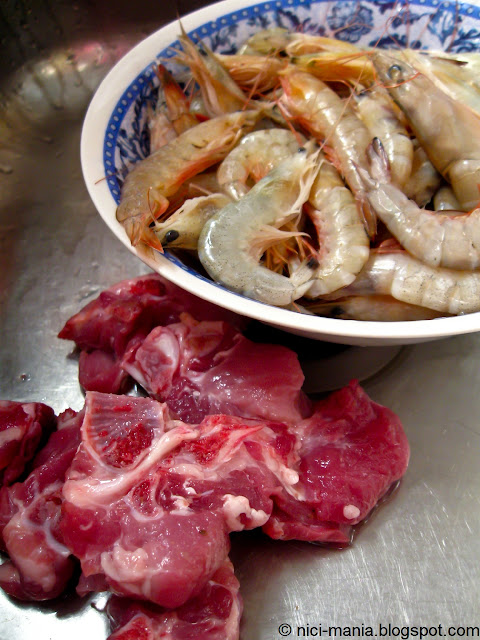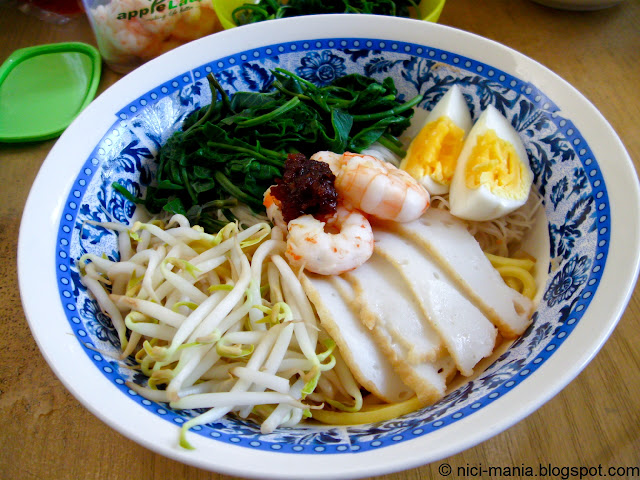Penang Hokkien Mee also commonly known as prawn noodle soup or simply prawn noodles is one of the most definitive hawker food from Penang island in Malaysia. The most significant thing about this prawn noodle is the richly flavored prawn soup base enhanced with pork bone stock. It is called Hokkien Mee only in Penang, people call it Hae Mee in Singapore and other parts of Malaysia like KL and Johor. The major difference that sets the Penang Hokkien Mee (prawn noodle soup) apart from other versions of prawn noodle soup is, Penang Hokkien Mee serves yellow noodles together with mee hoon (vermicelli) whilst others only serve yellow noodles. Local Penang people will tell you that yellow noodles and vermicelli mix is a tastier way of eating prawn noodles but others will say that it taste weird to mix vermicelli into the soup. Your mileage may vary but today, Jolly Wolf is going to show you the prawn noodle recipe for the Penang Hokkien Mee.
Penang Hokkien Mee - Prawn Noodle recipe for 4 pax
Prawn noodle soup recipe ingredients - 1kg of Sea Prawns (red shelled sea prawns preferred) to be de-shelled but keeping the head and shell.
- 300 grams of pork bone (or pork ribs if you have more money)
- Chicken stock (cubes or powder)
- 1.5 litres of water (estimated, no need to really measure)
- 150 grams of yellow noodles
- 150 grams of vermicelli
- A $1 pair of Kang Kong (water convolvulus)
- 40cents of bean sprouts
- 2 hard boiled eggs
- Fish cake slice (optional)
- 4 teaspoons of fine salt
- 3 tablespoons of cooking oil
| Ingredients for chilli paste - 150 grams of shallots
- 75 grams of garlic
- Dried shrimps
- 2 tablespoons of chilli powder
- 1.5 teaspoon of fine salt
- 1 teaspoon of sugar
- A whole bunch of cooking oil
|
This is the red shell sea prawns. Always stick to wild sea prawns instead of cultivated seafood because those prawns from the sea taste much much sweeter.
The pork meat we bought today is the front part of the ribs. It is still called the pork ribs but it is much cheaper than the spare ribs whilst the meat is still as soft and tender. The authentic Penang hokkien mee serves with the cheapest lean meat cut into extremely thin slice which is hard and dry, we don't like that. Prawn noodle soup elsewhere sometimes serves together with pork ribs, which is the more expensive version, but its no longer authentic prawn noodle anymore as the significant meat for this dish should be the prawns.
De-shell the prawns, keep the prawn meat in another container. The prawn head and shells are the most important ingredient for prawn noodle soup. We use it to cook the prawn soup base! Before we go on to cook the prawn stock which takes a shorter time, let's cook the pork bone stock first.
1. First, blanch the pork front ribs in a small pot of boiling water to remove the dirty particles and blood smell of the pork.
2. While blanching the pork ribs, you can already start boiling a big pot of water.
3. After blanching the pork ribs, pour away the water and wash the ribs under running water.
4. Transfer the pork ribs into the big pot and let it boil for 1.5 hours.
Next, let's head on to cook the prawn noodle soup base.Heat up the wok and add 3 tablespoons of cooking oil. We dumped in some shallots as we bought one whole pack and the prawn noodle chilli paste only needs about 150 grams. Sauté the shallots until their outer later turn slightly brown..

Next we add all the prawn head and shells into the wok and fry them in high heat for about 5 minutes until they turn orange and the explicit grilled crustacean smell comes rushing into your nose. While frying the shells, we poked the prawn head so that the delicious essence of prawn roe gets squeezed out. Then we add water into the wok enough to cover the prawn head and shells and simmer for 20 minutes. Filter the prawn stock and mix it into the big pot of pork ribs stock beside. Let us take you back with some history lesson on Penang Hokkien Mee (Prawn Noodle soup).

Back to the 50s and 60s, our grandma's prawn noodle recipe is slightly different. She would bring out her huge mortar and pestle and smash the uncooked prawn heads until all the juicy prawn roe seeps out. Then she would cook the smashed prawn heads directly with water and after that, she would filter the prawn soup with a cooking filter cloth so that when you drink the soup you won't get the bits and pieces of the prawn shells. Then in the 80s and 90s, a thing called blender is invented and mommy who has inherited grandma's Hokkien Mee prawn noodle recipe blends the prawn head and shells. The same filter method was applied afterwards. Present day, the wayward son who also inherited the Penang Hokkien Mee prawn noodle recipe is lazy to bring out the blender. Got the story?
We can now start to preparing the chilli paste for the hokkien mee prawn noodle soup. 150 grams of shallot and 75 grams of garlic plus a small handful of dried shrimp (washed and soaked for 5 minutes).
Next we bring out the family heirloom, the mortar and pestle. This is not the big sized one that grandma use, it is the small one mom uses.
Mix the nicely smashed shallot, garlic and dried shrimp together and add in 2 tablespoons of chilli powder. Okay the traditional way our grandma and mom does is using soaked dried chilli. They will mix them up together with the mortar and pestle. The advantage of using the traditional method is, the end product chilli paste is slightly tastier. The advantage of using chilli powder is, it saves time and the chilli paste won't have those insoluble chilli seeds.
Add a heap of cooking oil in a hot wok, don't be stingy or try to be healthy here. Sauté the chilli paste in medium heat until it tuns reddish brown. Add 1 teaspoonful of sugar and salt each. |
|
Blanch the prawns in the prawn+pork broth for the soup to get more prawn taste.
Scoop 2 ladles of the fried chilli paste from the wok earlier and mix them in the prawn+pork broth. Set aside the remaining of the chilli paste in a small bowl. We added 4 teaspoonful of fine salt and scooped a ladle of chicken stock powder to the prawn+pork broth. The flavorings can be up to individual but please be warned that the prawn noodle ingredients are pretty much tasteless, if the prawn noodle soup is not extra salty, your nice bowl of Penang Hokkien Mee will be tasteless when it is added with the bland ingredients.
Wash and pluck out the leaves and stem of the Kang kong (
water convolvulus). We love this vegetable but usually hawker stalls that sell Penang Hokkien Mee (prawn noodle) is very stingy with the kang kong (water convolvulus). Bean sprouts is also another mandatory ingredient to hokkien mee. Since this prawn noodle soup is homemade, we are gonna add a lot vegetables. Let us prepare the rest of the ingredients.
2 hard boiled eggs (broke one egg when peeling the egg shell *bummer*). Fish cake is already cooked, so just cute them into thin slices. Bring a big pot of water to boil, par boil the ingredients in this order so that you don't need to change new water after boiling each ingredient. Start with the ingredient that produces the lowest amount of pollution to the boiling water:
1. Boil the bean sprouts for about 15 seconds and sieve them out.
2. Boil the kang kong (
water convolvulus) for about 30 seconds and sieve them out.
3. Boil the pre-soaked vermicelli (mee hoon) for about 30 seconds and sieve out.
4. Boil the yellow noodles last!
Our Penang Hokkien Mee recipe (prawn noodle soup) is almost done. Prepare a big bowl and start arranging all the ingredients neatly in the bowl. The ratio of the yellow mee and mee hoon (vermicelli) is 50 to 50. Then the hard boiled eggs, fish cake slice, kang kong, bean sprouts, prawns and a dash of chilli paste alas!
Jolly Wolf please wait! Our Penang Hokkien Mee (prawn noodle soup) is not done yet. The final step will be adding the prawn soup into the bowl of noodle and ingredients. Jolly Wolf already cannot wait to savor the delicious bowl of prawn noodle.
Hope you liked our homemade Penang Hokkien Mee recipe prawn noodle soup. We did eat the front pork ribs that were cooked in the broth for 1.5 hours. It is very soft and tender but it is not featured in the pictures as it doesn't look very aesthetic with other polite looking ingredients. Then main difference between our homemade prawn noodle soup and the Penang Hokkien mee selling at the hawker stalls is that our homemade prawn noodle taste more refreshing and much less burden on your taste bud.

























































